Cresco Labs’ $2 billion acquisition of Columbia Care has been pushed back to this summer, but that should not be a surprise given the bureaucratic and logistic nightmare of merging two giant multi-state operators.
The bureaucratic hitch in the proposed merger is a result of the number of states involved. Cresco Labs will enter six new states, while needing to divest in at least five more. So that’s 11 sets of state authorities that have to approve the transfer of cannabis assets, with divestitures needing to be secured before the company can get final approval of the larger acquisition deal.
During a March 16 investors call to coincide with the release of Cresco Labs’ fourth quarter report, Cresco CEO and co-founder Charles Bachtell said that the company was still working on selling operations in Florida and at least five medical dispensaries in Ohio.
This came about two weeks after Cresco Labs announced an agreement with Columbia Care to extend the deadline for their merger deal from March 31 to the end of June 2023. The announcement specifically cites the need to finalize divestiture agreements and obtain regulatory approval.
Both companies have sizable footprints in several states, many of which have limits on the number of cannabis licenses a single company may own. So any overlap in states where both companies already operate could require divestments.
Specifically, the deal as is would result in Cresco Labs having more licenses than are allowed in Illinois, Ohio, New York, Massachusetts and Florida.
Cresco announced a deal last fall allowing the company to divest in New York, Illinois and Massachusetts with hip hop producer-turned-mogul Sean “Diddy” Combs, allowing the latter to enter the cannabis industry with his own MSO. That leaves operations in Ohio and Florida remaining to be sold.
“We continue to work through our two remaining material divestitures in Ohio and Florida and are making progress in both,” said Bachtell during the company’s March 16 investor call. “The capital market conditions have undoubtedly changed since we originally started this process, but we continue to see interest in these assets and in the cannabis industry from investors who have a longer time horizon and recognize the asymmetric payoff potential given today’s valuations.”
Unlike most large-scale mergers between multi-state organizations, strict rules for cannabis businesses that differ from state to state make it particularly tedious for weed companies to make ownership changes.
The last major update from this deal came in November, when it announced a deal for hip hop producer Combs to acquire businesses in three of the five states in which Cresco must divest from in order for the acquisition to not violate state license caps.
With a purchase price of $185 million, the initial terms of the deal include Combs paying $110 million in cash and assuming $45 million in debt, according to a press release from Cresco. Any payments beyond that would occur post-closing and would be conditional based on undisclosed “market-based milestones.”
Financing is increasingly more difficult for current and aspiring cannabis operators. In Combs’ case, his large upfront cash investment likely made it easier to secure the transaction before Cresco had been able to announce any other large divestments.
It also helps that the president of Combs Enterprises, Tarik Brooks, also happens to serve on Cresco’s board of directors. Brooks has worked for Combs Enterprises for almost five years. Cresco announced on April 22, 2021, that Brooks had joined their board, less than a year before Brooks had ascended to the role of president.
The majority of assets that Combs Enterprises will gain are currently owned by Columbia Care, with a heavy slant toward medical cannabis. Every New York business in the deal is medical only, two of the Massachusetts dispensaries are medical/adult-use hybrids, as is one of the two Illinois retail acquisitions. Only two dispensaries in the total deal are exclusively adult use.
Of those operations, Combs Enterprises will acquire dispensaries in major markets, including Brooklyn, Manhattan, Chicago, and Worcester, Mass.
The purchase of Columbia Care gives Cresco entry to markets in Utah, Arizona, California, Colorado, Florida and Missouri — which started legal adult-use sales on Feb. 3, following a successful legalization ballot measure that hit the polls last fall.
Aside from the deal with Combs Enterprises, Cresco Labs will still have to sell off at least five dispensaries in Ohio and figure out what to do with an extra medical license in Florida.
The fourth quarter report noted that Cresco’s revenue in 2022 was $843 million, a 3% increase from the last year. Despite the increase, the company saw a net loss of $215 million for the year.
“We’re ensuring we have the most strategic geographic footprint, as we look to optimize our footprint to drive profitability and long-term industry leadership,” said Bachtell. “We’re prioritizing having exposure to growth states of tomorrow along with scale and diversification and profitability across our current markets.”
Bachtell noted that demand for cannabis in the country is strong, but federal prohibition continues to hamper growth in the industry, especially at the investment level.











